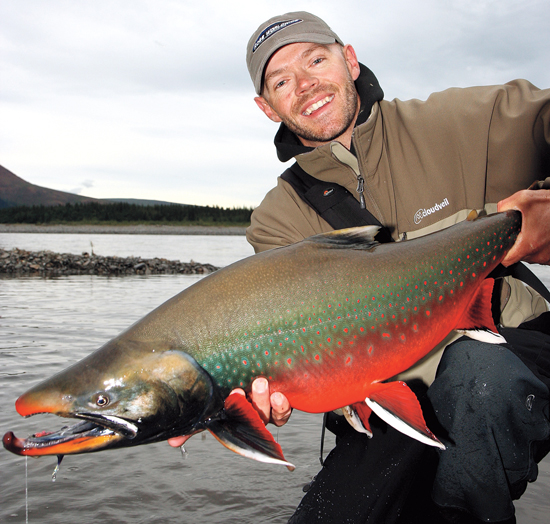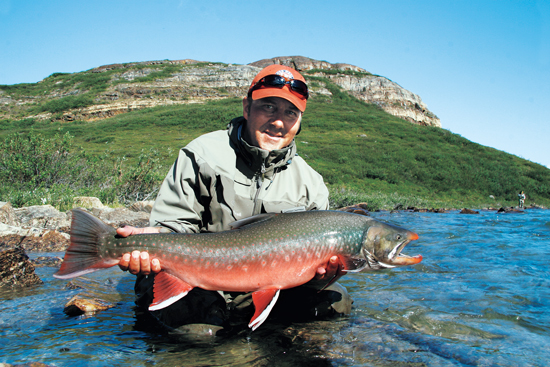Hunting and Fishing News & Blog Articles
Maine’s Arctic Charr Endangered

Photo by Wikipedia
An endangered Arctic Charr in Maine is under threat from invasive Smelt in its home water, and resource managers are now apparently discussing relocating the entire population. Bald Mountain Pond is home to one of only twelve of the last remaining wild Arctic Charr populations in the US, which are considered the oldest strains in North America. The Bald Mountain lineage in particular represents unique adaptations owing to thousands of years of isolation.
According to Wikipedia, “Arctic Charr are native to New England, Canada, Alaska and Europe. Once found in Maine, New Hampshire and Vermont, they are now extant in Maine only. Maine’s Arctic charr are the southernmost populations in the world and reported to be the oldest strain in North America.”
“Maine’s Arctic Charr are the rarest freshwater salmonid east of the Rocky Mountains. They are classified as a Tier-1 Species of Greatest Conservation Need by MDIFW, the same classification as federally endangered Atlantic salmon. They are classified as Threatened by the Endangered Species Committee of the American Fisheries Society.”
Bald Mountain Pond, like many lakes in Maine, was carved out of solid granite during the last ice age. When the glaciers retreated, the landscape was covered with depressions that were interconnected by flooded melt waters. As climate conditions continued to become relatively more dry, lakes like Bald Mountain Pond became isolated genetic reservoirs for ice age fishes such as Arctic Charr. Freshwater Smelt are seen as competing with larval Charr for plankton sized food sources, and were probably introduced to the lake as bait — in violation of Maine law protecting Bald Mountain as a designated conservation resource.
While the value of the Bald Mountain Pond fish has been recognized from a scientific standpoint, advocates are saying that the response from fisheries managers needs to be rethought. Bob Mallard, speaking for the Native Fish Coalition, issued a group message to stake holders last week indicating the dire nature of the situation and the need for new solutions.
“To date there is no plan to try to save the Bald Mountain Pond Charr that we are aware of, at least in their historic water. While there is talk of moving the fish to another water, (and) while this may save the pond-specific strain, this is not a “no net loss” as some are trying to claim. In fact, while acting as a gene bank, the population would (become) no more or less valuable than any other introduced population.”
Mallard continues, “Losing the Bald Mountain Pond Arctic Charr would be the first loss of a native Arctic Charr population since Rangeley Lake in the early 1900’s and one of the worst ecological disasters in recent Maine history regarding native fish.”
Mallard’s overall point is assumed to reference the identified genetic adaptations of the Bald Mountain Pond fish relative to the specific conditions of the lake, which would presumably change in a new translocated environment.
University of Maine Ph.D. Biology program grad student Brad Erdman weighed in on the debate, saying, “The biggest risk at the moment is losing the entire Bald Mountain strain and the local adaptations that comes with it. I think we’re all on the same page that a healthy population in its original waterbody is much more valuable than a translocated population.”
Options for saving Bald Mountain Pond’s Charr population are complex and potentially expensive, including eradication of all existing populations and reintroduction of desired species, which can have unexpected consequences within ecological webs. Policy makers who are dealing with limited budgets and political realities will have to weigh their choices carefully in the face of what appear to be looming timelines to save a population that has been termed to be at critical risk.
Native fishes in their historical environments present a unique opportunity for emerging science to understand the factors that will allow for more interpretive management practices in the future. Hopefully, new data will help managers fulfill conservation goals.
The post Maine’s Arctic Charr Endangered appeared first on Fly Fisherman.
Copyright
© Fly Fisherman


